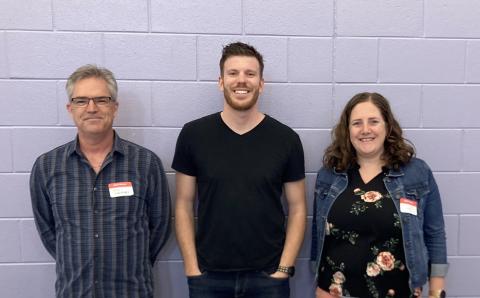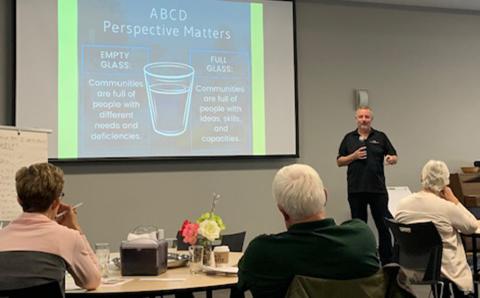Classis Chicago South, a regional group of congregations in the Christian Reformed Church, hosted a classis-wide service of unity May 21 to promote racial reconciliation.
About 250 people, representing 11 congregations in the classis and various racial groups, attended the service at Chicago Christian High School. The service was organized by a classis racial reconciliation committee that formed in February 2021 in response to a request from Pullman CRC in Chicago.
“We were there for the intention of worshiping together,” said Gary Foster, pastor of Pullman CRC and one of the event’s main speakers. “Worshiping in a context of God’s intention of making a diverse world and inviting us to live into that and to be candid about the problems that hinder and complicate that.”
Pullman CRC was originally established in the 1970s as a mission church. “(It) was intentionally planted to build a diverse church, particularly among those who were troubled by the ‘white flight’ (departure from the city by white residents to suburbs to west and south of Chicago),” Foster said.
About 65 percent of Pullman’s members are Black, and about 30 percent are white, Foster said.
“My embrace of our (Reformed) theology is that we live into that (diversity) now. Part of the already-but-not-yet is to live into that moment from Revelation (when every tribe and nation will bow before God),” Foster said. “I would say we live into it to proclaim and provide hope for others in announcing this is coming, that this is God’s blessing, that this is forthcoming, and being reconciled to God now is to live into that now.”
In its 2021 request to classis, Pullman’s council asked Chicago South to establish a multi-ethnic committee to “humbly analyze (the classis’s) history of racism and racist decisions,” set up a process “of honest confession, forgiveness, and reconciliation,” and consider ways in which racism might still exist in classis’s structure and decision-making.
Tim Toeset, a retired CRC pastor who attends Pullman CRC, chairs the racial reconciliation committee. He cited examples of CRC churches who moved out of the Roseland and Englewood neighborhoods when white families moved out of the city to the suburbs in the 1960s. At least seven congregations moved out of those neighborhoods, Toeset said.
“It’s that history that we want to acknowledge and confess and move away from,” Toeset said.
At the unity service Foster, who has been pastor of Pullman CRC for almost 12 years, and Tim Hoekstra of Suburban Life Community CRC in La Grange Park, Ill., presented messages based on the story of the Tower of Babel from Genesis 11, when God confused the speech of the people building the tower so they could not understand each other, and scattered them across the earth.
During the service, 7-year-old Nnamdi Phil-Ebosie, who attends Pullman CRC, recited from writings of the late Archbishop Desmond Tutu about God’s dream for people that “all of us will realize that we are family, that we are made for togetherness, for goodness, and for compassion.”
Foster said hearing the young boy read was very meaningful.
The service included music shared by participants from several congregations and communion.
Toeset said the reconciliation committee evaluated the worship service and intends to host another service, “probably not until next year around Pentecost.”
The committee has also recommended that congregations in Classis Chicago South prepare a four-week sermon series based on God’s Diverse and Unified Family, the CRC’s 1996 report on the biblical position and mission for race relations. Some of the biblical principles outlined in that report, which the committee emphasized, include that “the unity and diversity of the human race and of created reality reflect the unity and diversity of the triune God” and that “a fundamental effect of sin is the breakdown of community.”
Pullman CRC plans to conduct a sermon series in September, and several other congregations are said to be considering similar series.
“They left it up to the churches themselves to decide when and how to do that (series),” Foster said.
Toeset said the committee is considering other avenues for getting its message out, including a one-day workshop “with a variety of options to present to people, to encourage them to start thinking about the past of racism and what’s happening today and where we should go next.
Details of that workshop could be worked out at a future meeting of classis, Toeset said.
About the Author
Greg Chandler is a freelance news correspondent for The Banner. He lives in Grand Rapids, Michigan.









